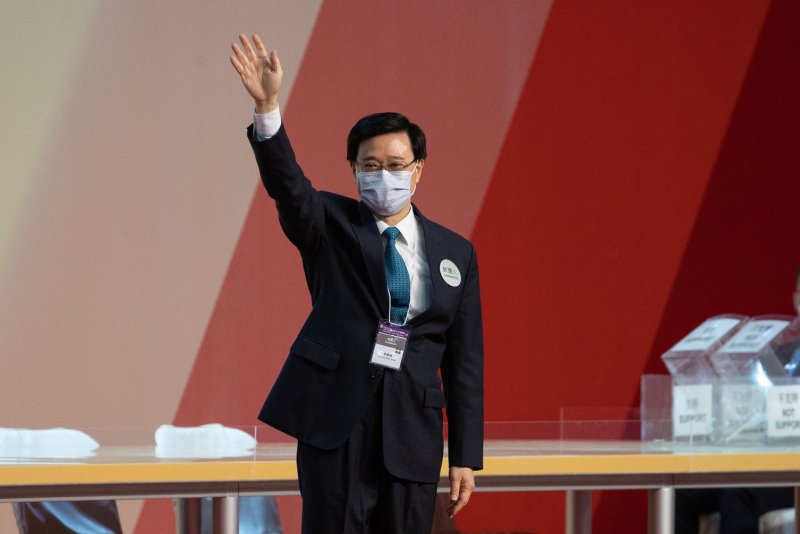John Lee, a Beijing loyalist and former security secretary, was elected to serve as Hong Kong's next chief executive after running unopposed. File Photo by Jerome Favre/EPA-EFE
May 8 (UPI) -- John Lee, the Hong Kong security secretary who led the response to the 2019 pro-democracy protests, was confirmed as the city's next chief executive on Sunday.
Lee, a Beijing loyalist who was sanctioned by the United States in 2020, was elected after securing 1,416, or 99.2%, of the 1,428 valid votes cast by an election committee dominated by pro-Beijing political and business figures.
Only eight members voted against him and four cast blank ballots, helping Lee, who ran unopposed, secure the highest tally in a leadership race since Hong Kong returned to Chinese rule in 1997.
Lee, 64, is the oldest chief executive to be confirmed for the position and also the first former police officer to take the lead role in Hong Kong in more than a century.
He will begin his five-year term on July 1, the 25th anniversary of Hong Kong's return to China.
Lee plans to push through Article 23, a package that includes new laws on treason, secession, sedition and subversion required by Hong Kong's mini-constitution that have been blocked from being passed into law by protests.
"With loyalty and perseverance, I shall undertake this historic mission and shoulder this responsibility to unite and lead the 7.4 million Hong Kong people to start a new chapter together," Lee said after he was confirmed.
Lee led a panel that vetted the election committee members for loyalty as chief secretary. By mid-April, he had garnered 786 nominations from the reduced 1,461-member committee and was ultimately the only candidate to receive enough nominations to make the ballot.
As chief executive, he is also less likely to face as fervent opposition to his plans to implement Article 23 as many pro-democracy leaders have been jailed or exiled under the government's sweeping national security law implemented in 2020.
Lee was one of nearly a dozen Hong Kong leaders, including his predecessor Carrie Lam, who were sanctioned by former U.S. President Donald Trump in August 2020 in response to the security law that criminalizes secession, sedition, subversion, terrorism and working with foreign agencies to undermine the national security of China in Hong Kong.
He is also the first person to be elected to head of the former British colony after its electoral system was overhauled by Beijing to ensure only so-called patriots held office in Hong Kong.
"This election is another step in the execution of the principle of 'patriots governing Hong Kong,' and showed the advancement and superiority of the new electoral system, and another successful implementation in the development of democracy with Hong Kong characteristics," Beijing's Liaison Office in Hong Kong said in a statement, saying Lee's election "is the solemn choice of Election Committee members, and the embodiment of the people's opinion."
Josep Borrell, the high representative of the European Union, criticized Lee's election as a violation of democratic principles and political pluralism in Hong Kong and the process by which he was selected as "another step in the dismantling of the 'one country, two systems' principle."
"The EU calls on Chinese and Hong Kong authorities to abide by their national and international commitments, notably the ultimate aim of electing the chief executive and members of the Legislative Council by universal suffrage," he said in a statement.















